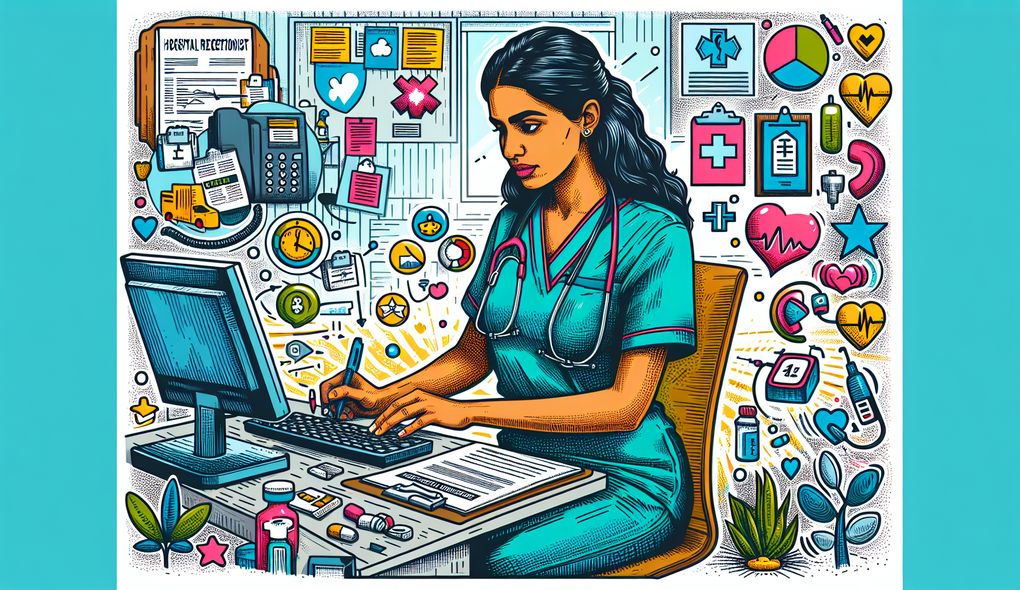Can you provide an example of a time when you had to problem-solve to resolve an issue?
JUNIOR LEVEL

Sample answer to the question:
One time, while working as a receptionist at a hospital, a patient came to the front desk in distress because they were lost and couldn't find their way to the correct department. I calmly approached the patient and asked for their appointment details. After checking the system, I realized that their appointment was actually in a different building on the hospital campus. I quickly apologized for the confusion and provided them with clear directions to the correct building. To ensure they wouldn't get lost again, I offered to walk them to the entrance of the building and personally directed them to the correct department. The patient was relieved and grateful for the assistance, and they were able to make it to their appointment on time.
Here is a more solid answer:
One example of a time when I had to problem-solve to resolve an issue was during my role as a hospital receptionist. A patient approached the front desk, visibly distressed and lost. I quickly assessed the situation and calmly approached the patient, asking for their appointment details. After checking the system, I discovered that their appointment was actually in a different building on the hospital campus. Recognizing the urgency, I apologized for the confusion and immediately provided clear and concise directions to the correct building. To ensure they wouldn't get lost again, I went above and beyond by offering to personally escort them to the entrance of the building and then directed them to the correct department. Throughout the interaction, I maintained a calm and empathetic demeanor, reassuring the patient and addressing their concerns. As a result, the patient was relieved and grateful for the assistance, and they were able to make it to their appointment on time.
Why is this a more solid answer?
The solid answer includes more specific details about the problem-solving techniques used, as well as how the candidate effectively communicated and provided exceptional customer service. However, it could benefit from further highlighting the candidate's multitasking and time-management abilities, as well as their teamwork skills when collaborating with healthcare professionals.
An example of a exceptional answer:
During my time as a hospital receptionist, I encountered a situation that required quick problem-solving and effective communication skills. A patient arrived at the front desk in a state of distress, unable to find their way to the correct department. Sensing their urgency, I immediately engaged in active listening, allowing the patient to express their concerns fully. Once I understood their situation, I calmly assessed the issue and identified the root cause: their appointment was scheduled in a different building on the hospital campus. With a sense of empathy, I acknowledged their frustration and apologized for any inconvenience caused. Utilizing my strong multitasking abilities, I swiftly accessed the electronic medical record system to gather the necessary information. Simultaneously, I effectively communicated with the patient, providing clear and concise directions to the correct building. Furthermore, understanding the importance of accessibility and personalized assistance, I offered to accompany them to the entrance of the building and personally directed them to the correct department. Throughout this process, I remained composed and displayed exceptional customer service, ensuring the patient felt supported and valued. As a result, the patient expressed their gratitude for the prompt resolution of their issue and made it to their appointment on time.
Why is this an exceptional answer?
The exceptional answer goes beyond the solid answer by providing even more specific details about the problem-solving techniques used, as well as emphasizing the candidate's effective communication skills, compassion, and empathy. It also highlights the candidate's ability to multitask and manage time efficiently, as well as their dedication to providing exceptional customer service. Additionally, it showcases the candidate's commitment to ensuring accessibility and personalized assistance for the patient, which aligns with the job requirements. Overall, the answer demonstrates a high level of professionalism and problem-solving capabilities.
How to prepare for this question:
- Reflect on past experiences where you had to solve problems or overcome obstacles in a professional setting. Consider situations that required effective communication, empathy, and multitasking.
- Think about your problem-solving approach and strategies. What steps do you usually take to address issues or challenges? How do you prioritize tasks and adapt to changing situations?
- Practice storytelling to convey your problem-solving experiences in a clear and concise manner. Focus on highlighting your communication skills, ability to remain calm under pressure, and commitment to providing exceptional customer service.
- Review the hospital's protocols and procedures, especially those related to health and safety guidelines. Familiarize yourself with the layout of the hospital campus to better assist patients in navigation.
- Consider how your problem-solving skills align with the desired qualities and responsibilities outlined in the job description. Prepare examples that demonstrate your expertise in effective problem-solving within a healthcare environment.
What are interviewers evaluating with this question?
- Problem-solving
- Effective communication
- Customer service skills

